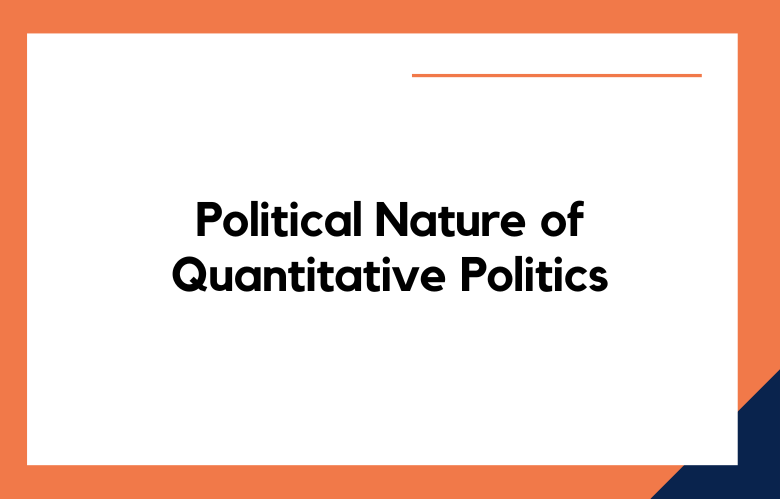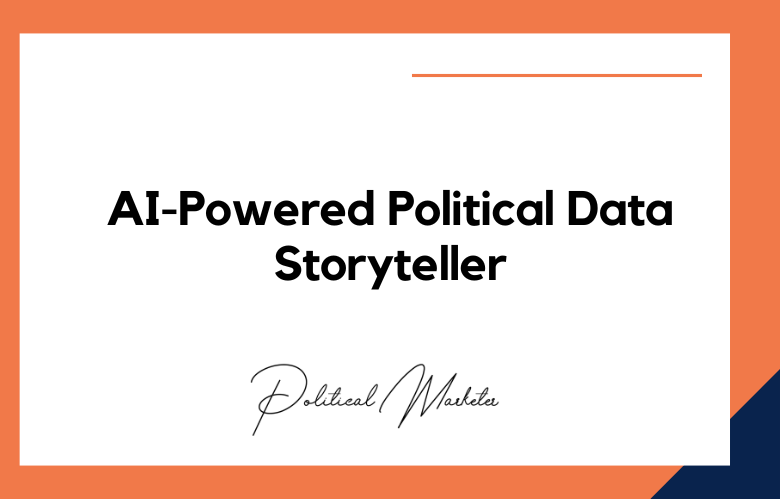Politics and statistics may not have much in common, but the two have become increasingly intertwined in today’s data-driven world. Using data analysis to influence policy decisions is known as quantitative politics, and it has become a significant force in modern politics.
However, this approach to policymaking has its controversies. We will explore the political nature of quantitative politics and its implications for democracy.
Quantitative politics is the use of statistical analysis to shape public policy. The idea is to gather data on a particular issue, such as crime rates or economic indicators, and use that information to make informed decisions.
What is the Political Nature of Quantitative Politics?
Quantitative politics, or quant-pol, applies mathematical and statistical models to political phenomena.
It boasts of its ability to solve political problems and inform policy decisions. Although quantitative politics seems objective and scientific, whether it is apolitical or inherently political is still debatable. We will explore the political nature of quantitative politics.
Quant-pol started to gain popularity in the 1950s, and since then, its use has been ubiquitous in the social sciences, particularly in economics, political science, and sociology.
Quantitative political scientists aim to explain political phenomena through mathematical models and quantitative data analysis. Quant-pol researchers believe their work is free from political biases, and their approach to politics is objective.
Understanding the Intersection of Data and Politics
Quantitative politics is an interdisciplinary field that uses quantitative methods, statistical analysis, and computational models to study various aspects of politics, including voting behavior, elections, public opinion, and policy.
While quantitative methods have been widely used in political science for decades, it is only recently that they have gained widespread attention in public discussions about politics and governance.
However, some argue that quantitative politics is inherently political, with implications for power, control, and legitimacy. We will explore the political nature of quantitative politics and its intersection with data and politics.
The political nature of quantitative politics can be understood in two ways: first, in terms of how data and analysis are produced, and second, in terms of how they are used.
The Political Nature of Quantitative Politics
In recent years, the use of data and statistics in political analysis has become increasingly prevalent.
From predicting election outcomes to informing policy decisions, quantitative politics is widely used to gain insights into the complex workings of political systems.
However, it is essential to recognize the political nature of these methodologies, as they are not neutral or objective tools but are somewhat shaped by political interests and perspectives.
We will explore the political nature of quantitative politics and the implications this has for our understanding of political phenomena.
Political decision-making is often based on quantitative analysis, as data and statistics provide concrete evidence for policy proposals. However, it is essential to acknowledge that data cannot speak for itself; it requires interpretation and context.
The Intersection of Politics and Numbers: Understanding the Political Nature of Quantitative Politics
Quantitative politics is the study of political events and behaviors through empirical data analysis. Although often viewed as objective and value-free, the social and political contexts within which data are collected, analyzed, and interpreted mean that quantitative politics is inherently political.
As the importance of quantitative methods grows in political science and public policymaking, it is critical to understand how politics shape quantitative research. It aims to unpack the political nature of quantitative politics and its implications for the discipline of political science.
Quantitative research in political science is rooted in the scientific method, which seeks to eliminate bias and subjectivity in the research process. However, as many scholars have noted, objectivity is not an attainable goal in research or any aspect of life.
Political Nature of Quantitative Politics: An In-Depth Look
Quantitative politics is the application of statistical methods to study political phenomena. It has become increasingly popular in the social sciences due to its ability to reliably measure complex social, economic, and political phenomena.
While often seen as objective and neutral, quantitative politics is deeply political. We will examine the political implications of quantitative politics and its impact on the social sciences.
Quantitative politics is based on the idea that the world is measurable and that objective measures can provide us with a better understanding of social phenomena.
However, what constitutes ‘objective’ measurement is contested and subject to political ideas of what is essential and how it should be measured.
Types of Political Nature of Quantitative Politics
Data Collection and Selection Bias
One of the fundamental challenges in quantitative research is data collection. The choice of what data to collect can have a significant impact on the results of the study.
Data selection bias occurs when researchers intentionally or unintentionally choose data that aligns with their preconceptions or beliefs.
For example, in a study on the effectiveness of a policy on education, data can be collected that supports the policy’s effectiveness. Still, data contrary to the policy’s energy can be ignored. This bias can lead to accurate results and, as a result, better policy decisions that may hinder progress.
Manipulation of Data
Another reason why quantitative research is inherently political is its susceptibility to manipulation. It is easy to manipulate data to create the impression of favorable results for a particular position or policy.
This manipulation can be done in various ways, such as carefully selecting data to exclude some variables, altering the interpretation of results, or creating false data.
When manipulation occurs, the research results can no longer be considered objective and, as a result, can be misleading and ultimately harm the political system. To prevent this, researchers should be transparent about their data and methods and exercise caution when interpreting results.
Political Power Dynamics
When it comes to politics and quantitative research, power dynamics often play a role. While data is usually considered powerful, politicians and policymakers may be reluctant to accept findings that challenge their policies.
It is common for the powerful to dismiss research that refutes their positions, discredit the researchers, or distort the research findings.
As a result, quantitative research can often be viewed as a threat to entrenched power structures, leading to resistance and attempts to undermine the research.
The Role of Research Funding
Funding has a considerable impact on the political nature of quantitative research.
For instance, researchers who work for private organizations or political parties may feel pressure to produce results favorable to their sponsors or political agenda.
This can lead to data manipulation, results, or findings, harming research and the political system.
Therefore, funding sources should be transparent, and the funders should exercise minimal control over the research process to prevent potential biases caused by researchers who work for outside interests.
The Need for Transparency and Open Science
Researchers should be transparent and open about their methods, data, and results to avoid the political nature of quantitative politics.
This practice allows researchers to establish trust and ensure that their work is seen as objective and reliable.
Ongoing collaboration between researchers, policymakers, and the public can reduce the influence of politics on research and promote practices that are in the public’s best interest.
Conclusion
Quantitative politics is a powerful tool for shaping public policy, but it has challenges. As with any approach to policymaking, some potential risks and benefits must be carefully considered.
Policymakers and the public alike need to be aware of the political nature of quantitative politics and critically evaluate data used in policymaking. By doing so, we can ensure that quantitative politics is used to promote the public good rather than undermine it.
Call: +91 9848321284
Email: [email protected]











